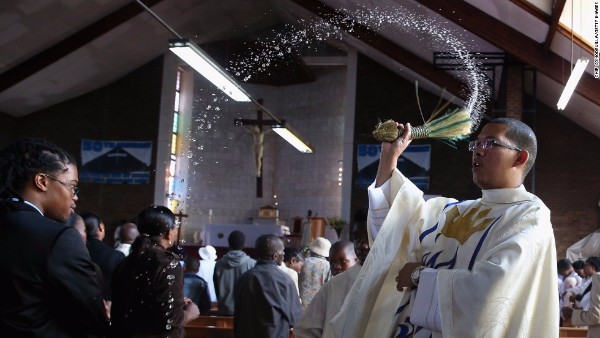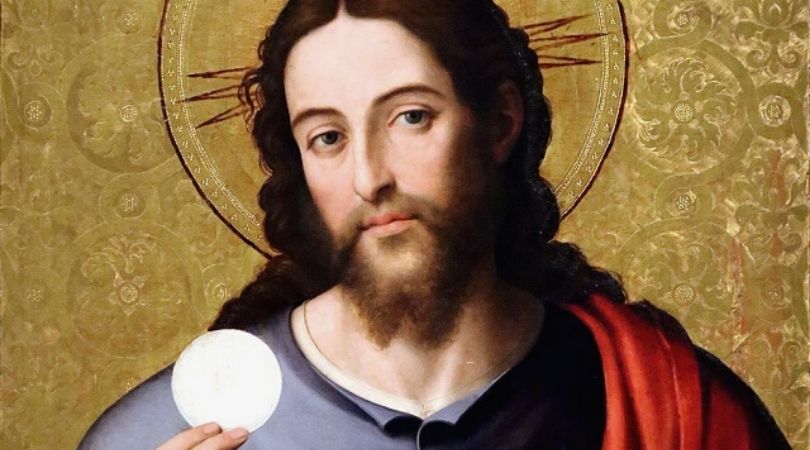In Praise of Holy Water

‘My Gift is From God’: Actor Jim Caviezel — a True Rarity in Hollywood — Has a Message About Mel Gibson’s ‘Resurrection of the Christ’
March 6, 2018
Novena to the Seven Gifts of the Holy Spirit
March 6, 2018
By By Michael Pakaluk, The Catholic Thing, March 6, 2018
![]() It used to be said that the priest “made” holy water; he did not simply bless it. The rite is still in the Roman Ritual. The priest makes holy water by adding exorcized salt to exorcized water.
It used to be said that the priest “made” holy water; he did not simply bless it. The rite is still in the Roman Ritual. The priest makes holy water by adding exorcized salt to exorcized water.
He adds salt in imitation of the prophet Elisha, who thus purified the waters of Jericho (2 Kings 2: 19-21): “Thus says the LORD, ‘I have purified these waters; there shall not be from there death or unfruitfulness any longer.’”
Holy water, in this rite, is understood as a pure creature directly conveying the power of God. Hence, both salt and water must first be exorcized, on the grounds that the Fall reverberated throughout all of material creation, giving Satan a dominion even over lifeless elements.
The exorcisms are bracing. For example, of the salt: “Our help is in the name of the Lord. Who hath made heaven and earth. I exorcise thee, thou creature salt, by the living God, by the true God, by the holy God. . .that thou may become health of soul and body to all who take thee; that every delusion and wickedness and snare of diabolical cunning and every unclean spirit may depart from the place in which thou shalt be sprinkled, when adjured by Him who is to come to judge the living and the dead and the world by fire. Amen.”
An exorcism is not simply a prayer but, as the philosopher J.L. Austin would say, “something done with words.” It remakes the salt and water, turning them in a special way into instruments against the Evil One. Thus the priest’s final prayer over the mixture entreats God to sanctify it so that “wheresoever it shall be sprinkled, by the invocation of Thy holy name, all troubling of unclean spirits may be cast out, and the dread of the poisonous servant be chased far away.”
The holy water in churches today, I believe, is typically blessed not made, the priest saying a prayer of blessing and making a sign of the cross over it, often in the context of Mass.
Far be it from me, not a liturgist, to claim that even holy water has been watered down. Yes, of course, I too have the thought, “If we could follow the example of a great prophet, and if we could use exorcized matter – why in the world wouldn’t we avail ourselves of these additional helps?”
Surely not on the minimalist grounds that the grace of Christ is sufficient, because then the argument for having holy water at all would be taken away. Moreover, Christ is a mediator, after all, who in his life on earth showed a strong liking for working through mediating matter, such as spittle and dirt.
Rather, from experience I know that blessed water works very effectively against the devil.
I mean first of all “experience” in the broad and proper sense, of what has been experienced by those we trust – not the attenuated Cartesian sense of what has impinged upon my own senses in particular. In this sense, St. Theresa of Avila’s experience is mine too: “I have learned that there is nothing like holy water to put devils to flight and prevent them from coming back again.”
Many friends have told me the same thing. They were troubled at night by twisted dreams, for instance – and after they began sprinkling holy water on the bed each night, and said a Hail Mary or three, the problem vanished and never returned. Something my own life experiences tend to corroborate.
Many of the friends I’ve mentioned, naturally enough, do not omit holy water when tucking in their children. But this leads to another reason for praising it, beyond its utility, namely, how attractive it is to children and child-like adults.
As children we marvel at bells, smoke, fire. The Church is right to appeal to our senses in this way. But consider that water, like fire, is not “supposed” to be within buildings. So even a small votive candle – that little point of brilliant fire, guarded by the wax but dangerous if it were to break out – can signify something transcendent, prayer ascending to God and light descending.
For a similar reason, we lean forward to get sprinkled with Holy Water on Easter Sunday, and we like to dip our fingers in the holy water font. As the water is not where it is “supposed” to be, it easily signifies inflowing grace from God, while it should lead us to consider our own baptism and the purifying efficacy of sacramental confession.
The family is a domestic church, not on its own, but as participating in the life of the Church. That little bottle of holy water in the household, then, testifies to the reality of Holy Orders and the power of the Church in the sacraments.
As holy water is held to be precious, and it comes solely from the priest, the priesthood is honored by it. As we get holy water freely – we need only bring a bottle to the church and fill it – it teaches that the most precious things in life have no price. They are freely given by God, if we simply look for them in the right place.
Finally, as water is an element, and holy water is a blessed element, it testifies to the goodness of creation, how grace completes nature, and the logic of the Incarnation.
There is a catechism contained in holy water. Alternatively, we can say that the true Church would, of course, have devised it. Alternatively, as truth is overdetermined by evidence, we can also say that the existence and use of holy water, like forty other things, is almost on its own a reason to become a Catholic.
Following St. Francis I want to say, “Praised be You, my Lord, through Sister HolyWater, which is very useful and humble and precious and chaste.”




